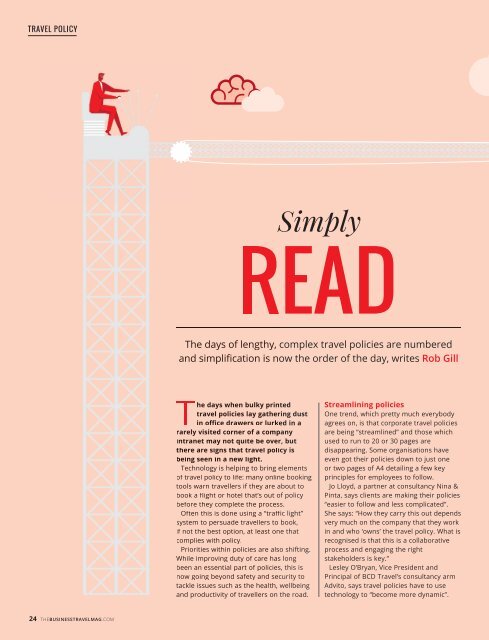Create successful ePaper yourself
Turn your PDF publications into a flip-book with our unique Google optimized e-Paper software.
TRAVEL POLICY<br />
Simply<br />
READ<br />
<strong>The</strong> days of lengthy, complex travel policies are numbered<br />
and simplification is now the order of the day, writes<br />
Rob Gill<br />
<strong>The</strong> days when bulky printed<br />
travel policies lay gathering dust<br />
in office drawers or lurked in a<br />
rarely visited corner of a company<br />
intranet may not quite be over, but<br />
there are signs that travel policy is<br />
being seen in a new light.<br />
Technology is helping to bring elements<br />
of travel policy to life: many online booking<br />
tools warn travellers if they are about to<br />
book a flight or hotel that’s out of policy<br />
before they complete the process.<br />
Often this is done using a “traffic light”<br />
system to persuade travellers to book,<br />
if not the best option, at least one that<br />
complies with policy.<br />
Priorities within policies are also shifting.<br />
While improving duty of care has long<br />
been an essential part of policies, this is<br />
now going beyond safety and security to<br />
tackle issues such as the health, wellbeing<br />
and productivity of travellers on the road.<br />
Streamlining policies<br />
One trend, which pretty much everybody<br />
agrees on, is that corporate travel policies<br />
are being “streamlined” and those which<br />
used to run to 20 or 30 pages are<br />
disappearing. Some organisations have<br />
even got their policies down to just one<br />
or two pages of A4 detailing a few key<br />
principles for employees to follow.<br />
Jo Lloyd, a partner at consultancy Nina &<br />
Pinta, says clients are making their policies<br />
“easier to follow and less complicated”.<br />
She says: “How they carry this out depends<br />
very much on the company that they work<br />
in and who ‘owns’ the travel policy. What is<br />
recognised is that this is a collaborative<br />
process and engaging the right<br />
stakeholders is key.”<br />
Lesley O’Bryan, Vice President and<br />
Principal of BCD <strong>Travel</strong>’s consultancy arm<br />
Advito, says travel policies have to use<br />
technology to “become more dynamic”.<br />
24 THEBUSINESSTRAVELMAG.COM

















